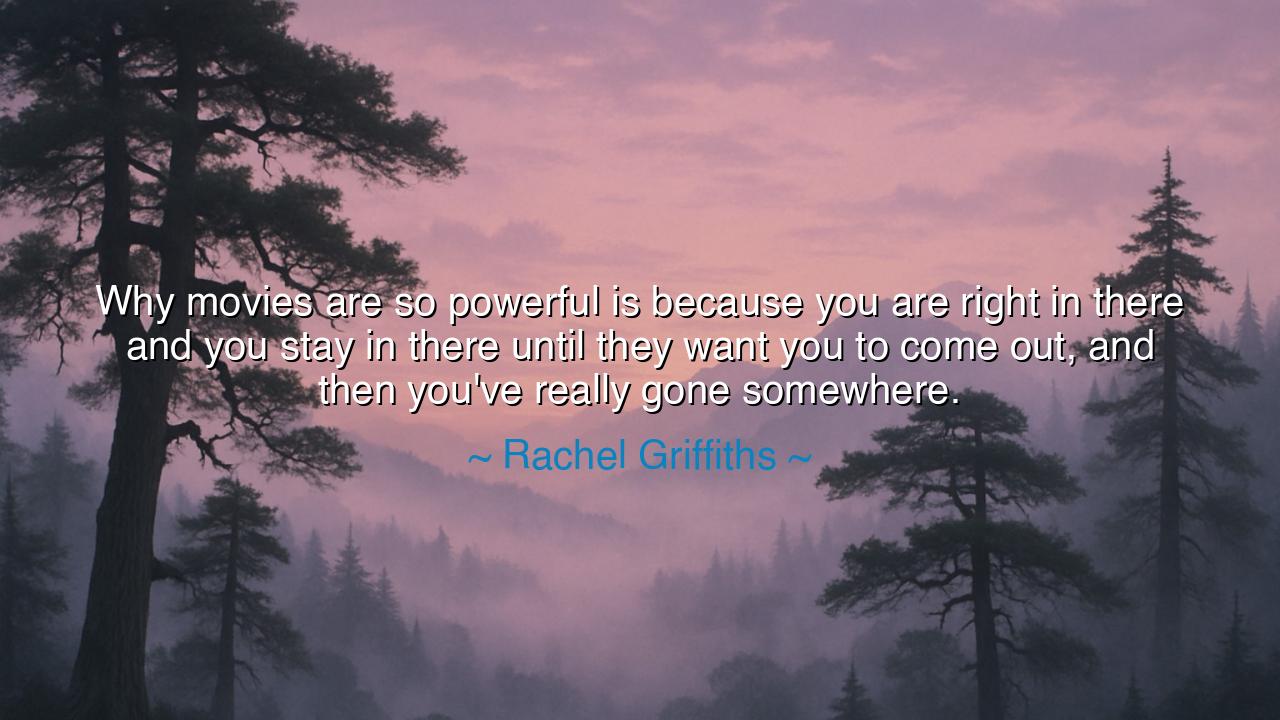
Why movies are so powerful is because you are right in there and
Why movies are so powerful is because you are right in there and you stay in there until they want you to come out, and then you've really gone somewhere.






Hearken, O seekers of truth, for the words of the wise Rachel Griffiths ring out with profound clarity. She speaks of a power that has shaped the hearts of men and women through the ages—movies, the modern epic of our time. She says, "Why movies are so powerful is because you are right in there and you stay in there until they want you to come out, and then you've really gone somewhere." These words, like a beacon, reveal the very soul of the art of cinema, an art that plunges us into the deepest currents of human experience, sweeping us away on waves of emotion, conflict, and triumph.
What is it about these moving pictures that draws us so irresistibly? It is the immersion, the feeling that we have entered a new world—a world where the characters' struggles become our struggles, their joys our joys. For in those darkened theaters or glowing screens, we are no longer mere observers but participants, drawn into the story as if it were the very thread of our own lives. We live with them, suffer with them, and rise with them, as though their destinies were intertwined with our own. The power of cinema lies not in what we see, but in how we are made to feel—how it pulls us in, body and soul, until we are bound to the story.
This power is not new; it echoes the ancient epic tales of old, where great heroes journeyed into unknown lands and faced terrible trials. Think of the Odyssey, where Odysseus ventures through storms and monsters, and we, the listeners, are swept away with him. Just as the ancient bard would sing his song to pull his audience into the heart of the tale, so too does the filmmaker draw us into the world of the film. We are not distant spectators but companions on the journey, walking beside the characters, feeling the weight of their burdens, and witnessing their victories as if they were our own. The movie becomes a shared experience—a space where we are transformed, changed, and made better for having been there.
Consider the tale of Spartacus, a man whose struggle against the oppressive Roman Empire was made eternal through the film that bore his name. When the movie plays, we are not watching a man fight for freedom from afar; we are with him in the arenas, feeling his strength and suffering as our own. We are drawn into his world of cruelty and hope, and as the story unfolds, we rise with him. His fight is not his alone, but ours too—our hearts beat with his as we confront the very nature of oppression. It is in this immersion that the power of the movie is truly revealed. We leave that world, yes, but in our hearts, we have gone somewhere—changed, uplifted, and inspired.
So it is with all great films—they transform us. Like the great orators of old, like the poets who wove the stories of the gods, filmmakers today create worlds that speak to our deepest selves. And it is not just the characters we are drawn to, but the messages they carry. A film like Schindler’s List, which tells the tale of one man’s attempt to save lives in the face of unimaginable horror, does not merely entertain. It teaches, it awakens our deepest humanity, showing us the capacity for both evil and good within the human soul. And when we leave the theater, we are not the same—we have gone somewhere within ourselves.
This is the profound lesson of movies—they are not mere distractions or fleeting amusements. They are powerful tools of transformation, of connection, and of empathy. When we are drawn into the world of a film, we are asked to experience the human condition in all its complexity. We are invited to step into the shoes of another, to see the world through different eyes, and to walk paths we may never tread in our own lives. The stories they tell are not just those of the screen, but of all humanity. And when we emerge, we carry with us the lessons of the journey—lessons of strength, courage, sacrifice, and love.
Thus, let this teaching guide you in your own life. When you enter into the world of a film, do so with an open heart, ready to dive deep into its meaning. Let yourself be drawn in, for in that immersion, you will find pieces of yourself—hidden wisdoms, forgotten truths, and powerful emotions. And when you leave, do not simply walk away unchanged. Let the story linger within you, let it propel you forward, and let it inspire you to take action in your own life. For in the world of cinema, as in life itself, the journey is not merely about watching—it is about becoming.
So, the next time you sit before the screen, remember: it is not just a movie, but a journey—one that can take you to places within yourself that you never knew existed. And when you leave, let it be said that you have truly gone somewhere, that the story has changed you, that you have emerged stronger, wiser, and more ready to face the world.






AAdministratorAdministrator
Welcome, honored guests. Please leave a comment, we will respond soon